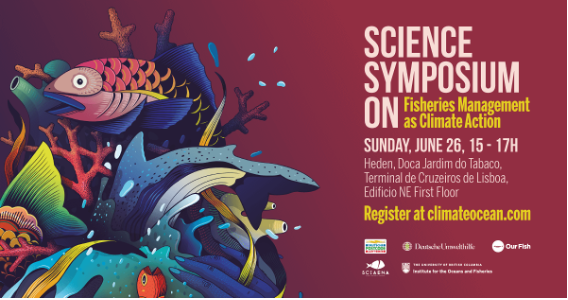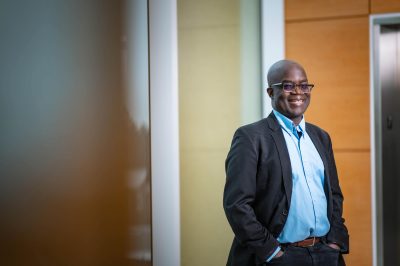 UBC Institute for the Oceans and Fisheries (IOF) professor and Director, Dr. William Cheung, and University Killam Professor, Dr. Rashid Sumaila, who is also cross-appointed in UBC’s School of Public Policy and Global Affairs, are off to Lisbon, Portugal shortly for the United Nations Ocean Conference (UNOC). They bring with them a message for policymakers worldwide: ending overfishing is climate action.
UBC Institute for the Oceans and Fisheries (IOF) professor and Director, Dr. William Cheung, and University Killam Professor, Dr. Rashid Sumaila, who is also cross-appointed in UBC’s School of Public Policy and Global Affairs, are off to Lisbon, Portugal shortly for the United Nations Ocean Conference (UNOC). They bring with them a message for policymakers worldwide: ending overfishing is climate action.
Running from June 27 to July 1, the UNOC brings together Heads of Government and State with leaders from the private sector, the scientific community and other partners to “chart a new pathway that would ensure the protection and conservation of the ocean and its resources.”
 Dr. Sumaila and Dr. Cheung have partnered with European NGO Our Fish to join a panel of experts from universities around the world for a science symposium being held in Lisbon on June 26: Fisheries Management as Climate Action.
Dr. Sumaila and Dr. Cheung have partnered with European NGO Our Fish to join a panel of experts from universities around the world for a science symposium being held in Lisbon on June 26: Fisheries Management as Climate Action.
“This symposium is about how reducing overfishing can also help climate change mitigation,” Dr. Sumaila said. “Why? Because scientists estimate we take out 2.5 times the fishing effort needed to catch fish sustainably. In doing so, we’re truncating the food web and weakening life in the ocean so it is not as resilient when there’s a climate shock. There’s also the fuel used to overfish which releases CO2 unnecessarily; bottom trawling, which releases stored carbon at the bottom of the ocean; and the fact that many elements of marine life actually sequester carbon for us. Ending overfishing is both climate mitigation, and climate adaptation.”
 All of the panelists invited to the June 26th symposium contributed studies to a special issue of the journal Frontiers in Marine Science, which detailed how cutting back our fishing efforts can also help us confront climate change, and they will present these findings at the symposium. Dr. Sumaila’s contribution explored how putting a stop to overfishing would reduce the number of carbon-emitting boats in the water, and keep fisheries sustainable.
All of the panelists invited to the June 26th symposium contributed studies to a special issue of the journal Frontiers in Marine Science, which detailed how cutting back our fishing efforts can also help us confront climate change, and they will present these findings at the symposium. Dr. Sumaila’s contribution explored how putting a stop to overfishing would reduce the number of carbon-emitting boats in the water, and keep fisheries sustainable.
“Before now we’ve always been talking about how climate change will impact life in the ocean, and therefore fisheries,” Sumaila said. “However, it’s not unidirectional. Now we’re seeing that our fishing activity can impact climate change. Now that this connection has become clearer, fisheries research can feed into the work done by the Intergovernmental Panel on Climate Change (IPCC).”
Dr. Cheung will present his findings on how marine protected areas and good fisheries management can help reduce the impacts of climate change on rebuilding and conserving fish stocks. He hopes that the conference will raise awareness about the role that the oceans play in mitigating climate change, and highlight the dangers of neglecting them in national and international carbon reduction strategies.
“Ultimately our goal is to inform policy decisions,” Dr. Cheung said. “Countries are updating their commitments for climate change mitigation and adaptation, and they need to build policies that end overfishing into their portfolio of climate change solutions. We hope that by having this side event, we can provide further justification of why overfishing needs to be included.”
The IOF and Our Fish have also organized a cocktail reception, a “swim and breakfast” event, and two “breakfast briefings” to take place throughout the week.
Tags: CORU, FERU, IPCC, Marine protected areas, NGO, overfishing, policy, Rashid Sumaila, United Nations (UN), William Cheung
